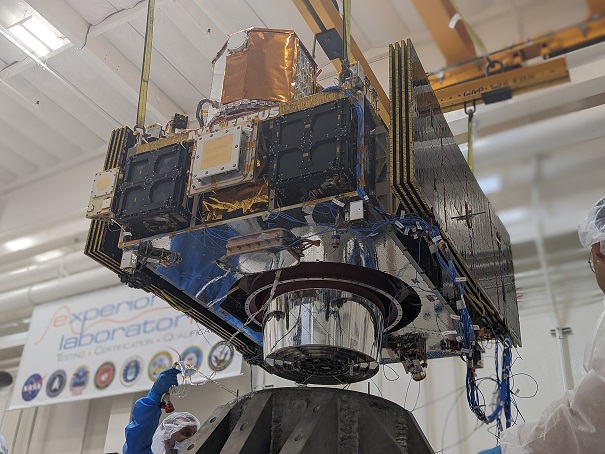Two orbital service vehicles have completed critical environmental testing including vibration testing
Momentus has completed performing the vibration testing of its Vigoride Orbital Service Vehicle, which is scheduled to put into orbit on board the SpaceX Transporter-10 mission no earlier than March 2024.
The US commercial space company has developed the Vigoride vehicle as part of its range of satellite buses and in-space infrastructure services including transport, hosted payloads and other in-orbit missions.
The vibration testing took place at the Experior Laboratories and subjected the Vigoride spacecraft to the forces and environmental factors that it is likely to experience during the demanding launch process next year.
According to Momentus’ Chief Commercial Officer Chris Kinman, the launch of Vigoride-7 will be the fourth flight of the company’s Orbital Service Vehicle so the company knows what to expect on the launch pad.
“On this mission, we are scheduled to carry the payloads of seven customers that require orbital delivery services and two customers requiring hosted payload services. We also plan to carry a Momentus-hosted payload that we will use to conduct a rendezvous and proximity operations demonstration – a key capability to support our reusability and sustainability goals,” he explains.
The test facilities at Experior Laboratories are the home to a number of state-of-the-art electrodynamic vibration testing systems. These have been specified to enable the test house to be able to handle large and heavy devices under test and subject them to the most demanding vibration and shock testing specifications.
The Southern California based laboratory is also able to handle oversized and particularly heavy payloads for vibration testing. For these, the Experior Labs’ vibration testing systems can be used in tandem to provide a combined 80,000 lbf.
In the past, such applications have included rocket engines, rocket stage separation actuators, satellites, orbital reflectors, electric vehicle batteries, railroad components and many more. Custom-made vibration testing fixtures and slip plates enable the test house to test parts of almost any shape and size.
Payload Delivery Demand
There is high demand for payload delivery services and a Vigoride vehicle has already been passed to fly on the SpaceX Transporter-9 mission, on which Momentus will use a plate deployer to provide transport services for five payloads.
The next payloads to make use of the Vigoride service include an earth observation satellite for Poland, a South Korean satellite for taking photographs of the earth, a CubeSat for performing US sub-surface imaging in the search for underground mineral and water resources, and two Turkish satellites for providing Internet of Things (IoT) services.
So far, Momentus has executed three orbital missions, including the deployment of 15 customer payloads, and provided hosted payload services. The Company is currently booking rideshare and hosted payload customers on the SpaceX Transporter-11 mission targeted for no earlier than June 2024 and the SpaceX Transporter-12 mission targeted for no earlier than October 2024. The company provides its transportation and in-space services on either a deployer mounted directly to a Rideshare modular plate or a Vigoride Orbital Service Vehicle depending on customer mission requirements.
AI-Enhanced Satellite Ready for Launch
Specialist satellite company Sidus Space, has also been making preparations for a forthcoming launch and has reached a critical milestone in its bid to reach orbit during the first quarter of 2024. The AI enhanced “LizzieSat” satellite has just made a successful completion of environmental testing.
According to Lindsey Waitt, LizzieSat Programme Manager, the environmental test is a critical step in the validation of the LizzieSat satellite as being ready for its forthcoming flight in addition to having been able to complete other critical actions including obtaining the necessary launch and operating licence. “I am incredibly proud of the Sidus Engineering team who has worked tirelessly to achieve this important milestone and we look forward to the launch of LizzieSat early in 2024.” He says.
Sidus Space is based in Cape Canaveral, Florida, where it operates from a 35,000-square-foot manufacturing, assembly, integration and testing facility for its range of data as a service satellite equipment and other space related hardware.
The environmental tests that Lizziesat underwent were completed by NTS Orlando where the data satellite was subjected to random vibration testing resulting in flight-qualification levels. The test was performed on the fully integrated LizzieSat Satellite that is manifested to launch into space early next year.
Established in 1986 as Qualtest and acquired by NTS in 2015, NTS Orlando offers an extensive array of test services delivered by an experienced team dedicated to serving the testing needs of Aerospace, Defence, and a variety of commercial customers.
Payload Test System
Rohde & Schwarz has also recently been demonstrating RF and millimeter-wave measurement systems for satellite communications, navigation, earth observation and space exploration.
Satellite communication systems must cover a diverse set of requirements in direct broadcast, wireless communications and remote sensing applications, operate reliably 24/7 with multi-decade system longevity, and be thoroughly tested to ensure a quality of service over the life cycle of the satellite.
The new set of products from R&S includes the ZNA low-noise vector network analyser, SMW200 configurable vector signal generator, FSW signal and spectrum analyser and the GSACSM signal monitoring system for multi-device spectrum monitoring and satellite antenna testing for laboratories.
The range contains test systems suitable for equipment both on the ground and on-board space vehicles. These include ground stations and ground terminals, positioning and navigation systems, satellite components and payloads, small satellites and transmit/receive modules and antennas.
- UK manufacturing steps up to COVID-19 crisis - April 2, 2020
- Clustering Innovation - March 12, 2020
- A Global Monitor - March 6, 2020

